Many of us take riding a bicycle for granted. Often, it’s a skill we learn as children and provides our first real taste of freedom to get ourselves around – wherever and whenever we like. And even if we later spurn the bike for a car or the bus, most adults could easily hop back on a bike at any time.
But not everyone has had the opportunity to learn to cycle, which is where initiatives like Bike Bridge play a role. This Christchurch initiative provides free bike lessons for women and got started after a one-off event highlighted a real need among the city’s former refugee and migrant communities. I talked with coordinator Lois Hill about how it works, her involvement with the initiative, and what impact Bike Bridge is having.
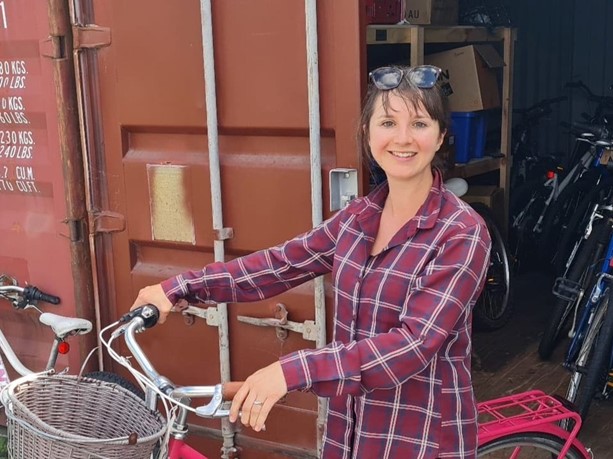
About Bike Bridge
Bike Bridge is all about providing a safe and supportive environment for women to learn how to ride a bicycle. The initiative is mainly targeted at former refugee and migrant women, whether they be absolute beginners or those looking to improve their skills and confidence on the road.
Lessons are free and held every Wednesday evening at Addington School during daylight savings hours. No booking is required, and there is no obligation for participants to turn up every week. Bike Bridge provides bikes and helmets for the lessons and, after having attended three sessions, the women get their own bike, helmet and bike lock so they can continue to practice and ride at home.
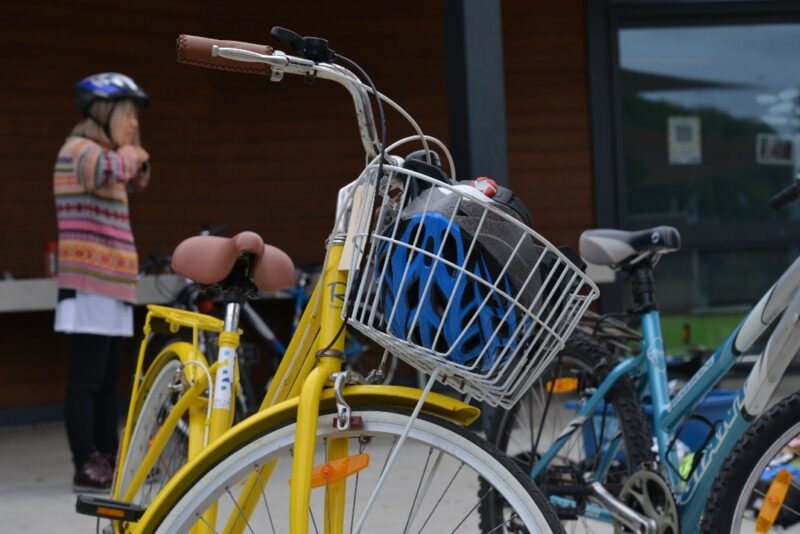
Bike Bridge has evolved over time. It was first set up as a one-year pilot in a collaboration between Te Whatu Ora health promoter Meg Christie and community organisations LJ and Friends and the South-West Baptist Church, following the success of a one-off event Meg organised (with others) for the 2019 International Women’s Day. Initially, there were lessons for men and for women, with bike fix-ups on site. However, while the women’s lessons were well-attended, the sessions for men were not, and there was feedback that the women felt less comfortable with men on site. So, Bike Bridge became a by women, for women project – offering free bike lessons for women, taught by women.
At around the same time, the initiative became associated with RAD Bikes (Recycle a Dunger), which was looking to extend its reach among women and diverse communities. The RAD Board is now the governing body for Bike Bridge. Lois says it’s a great fit as the initiatives were founded on common values and aspirations to empower the community and improve access to cycling. RAD has become a critical part of helping to supply and maintain Bike Bridge’s fleet of bikes, and Lois describes the RAD team as a wonderfully supportive and skilled bunch of people to work with.
At first, lessons were held at Ngā Puni Wai, which made available an area of its car park for Bike Bridge to use. However, with the expansion of Ngā Puna Wai’s sports facilities in 2021, this was no longer an option and Bike Bridge needed to find a new home. Lois says the community sector always finds a way to make things happen, so within a month Bike Bridge had a new home at Addington School, along with a storage container sponsored by the Cashmere Rotary Club. The move has worked out well. The school serves a diverse community, with strong connections to those who might benefit from the initiative, and the additional shelter provided by the school grounds has enabled Bike Bridge to introduce a kai break during lessons, increasing the opportunity for people to connect while they learn.
Demand for lessons surged in the first year at the new location, which required rethinking how lessons were delivered. Until then, volunteers had worked with the women on a one-to-one basis. Bike Bridge moved to a group training format and now runs three different groups on the school grounds on any given night:
- A beginners’ group focused on the basics like learning to scoot, balance and pedal.
- An improvers’ group working to develop skills like steering control, brake control, changing gears and looking behind while riding.
- A group developing on-road skills like understanding the road rules, indicating and making emergency stops.
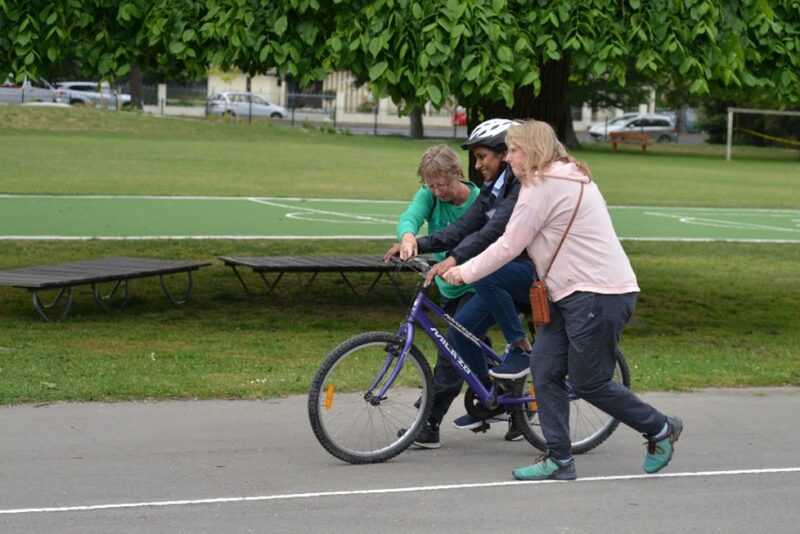
Once the women have worked through the stages and had their core skills checked off, they start riding on the road. So, on the night, there will be a fourth group doing a practice ride in the neighbourhood – practising passing parked cars, turning left and right, riding through roundabouts and so on. Lois says the rides are tailored to the needs of the women attending and there’s always a leader and a tail-end Charlie supporting the rides.
While lessons normally only run during daylight savings hours, this winter Bike Bridge is trialling daytime lessons during the July school holidays. The four sessions are being held on July 10-11 and July 17-18 (Wednesdays and Thursdays), from 11am to 1pm at Addington School. As with the evening rides, the lessons are mainly targeted at former refugee and migrant women and there is no need to book.
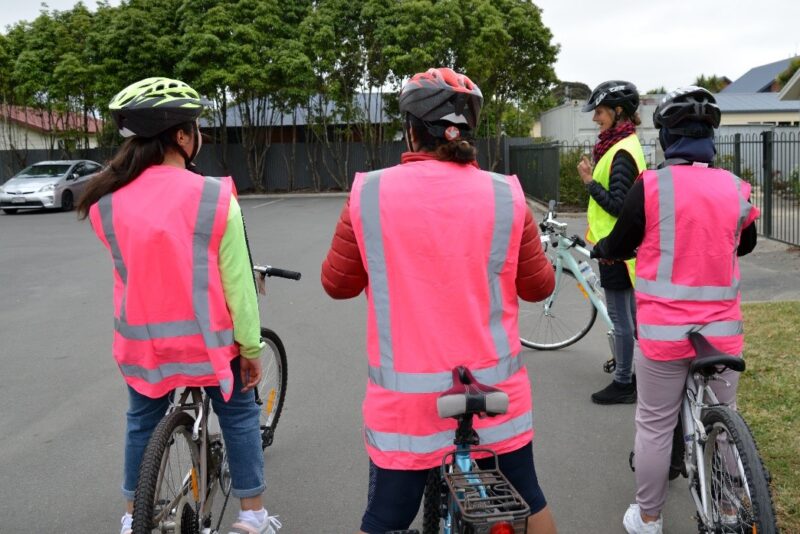
Lois’ involvement in Bike Bridge
Lois first got involved in Bike Bridge as a volunteer. Inspired by her sister’s work in refugee camps in Greece, she was looking for an opportunity to support refugee communities in New Zealand, ideally something that would fit with her love of the outdoors. When she saw a film about teaching migrant women how to cycle in Amsterdam at a Big Bike Film Night (Mama Agatha), she knew what she wanted to do.
She later became the coordinator for Bike Bridge and has been in the role since July 2021. It’s a paid position for eight hours a week for eight months of the year and works well alongside her other roles as an occupational therapist (for two days a week) and mother to a two-year old.
Lois says it was an exciting time to get involved with Bike Bridge as she’s had the opportunity to help shape its development. Her occupational therapy background influenced her thinking about having robust processes and taking a structured approach to bike lessons. When she took on the coordinator role, she arranged to attend three days of training provided by the Christchurch City Council for its cycle instructors, and then developed a framework for teaching the volunteers.
She says that, like occupational therapy, Bike Bridge is about building relationships with people, breaking things down into the specific skills they need, and empowering them to move forward.
It’s important that there’s lots of support available to learners on-site, so the initiative is really powered by its volunteers. Lois’ role involves coordinating the volunteers, responding to queries (such as offers of bike donations), organising equipment, promoting Bike Bridge and networking with community organisations (for example, doing presentations at the Purupura Whetu Trust, which provides resettlement support for refugees).
Working alongside Lois is the Bike Bridge Community Liaison, who helps with promotion, managing cultural considerations and welcoming participants on the night. For the six months that lessons are running, they’re both on-site at Addington School for four hours a week – setting things up, running lessons and packing things back down again. Lois says that RAD Coordinator Jess Smale and Meg Christie are also key figures in supporting Bike Bridge to run smoothly.
Bike Bridge intends to transition this year to being led by women from the migrant and refugee communities it serves, with one person to manage volunteers and another to manage project development and community liaison.
Bike Bridge’s impact
Getting people biking is just part of what Bike Bridge seeks to achieve. The biking’s important, and Lois says participating in the lessons has enabled women to cycle with their children and given them an independent means of transport to get to work, education and other places. But it’s also about the women taking time to do something for themselves, connect with others in a safe space and be empowered through mastery of a new skill. The lessons are also a lot of fun.
Here’s what some women have said about their Bike Bridge experience:
- “It was an indescribable feeling. I felt like a small bird that was finally able to flap its wings and fly.”
- “I enjoy riding the bike itself, the team, the space, the challenges and the atmosphere.”
- “I’m so grateful to have been able to learn to ride a bike with such lovely, supportive women. It’s long been a dream of mine to ride.”
Lois says the confidence women gain in their biking brings greater confidence in other aspects of their lives too. And while Bike Bridge was not set up in response to the 2019 mosque attacks, a lot of women said that attending the lessons was good for their mental health.
Bike Bridge has grown substantially over the past few years as word has spread. It recorded 391 attendances over the six months of the last season – an increase of 40% over the previous year – and gave away 109 pieces of equipment (bikes, helmets etc). The number of women attending lessons each week varies – some women come every week, while others come and go. Lois estimates that there are usually about 24 women a week in the period before Christmas, with numbers dropping back to about 14 in the new year.
It’s a diverse group, representing 30 different ethnicities and a wide range of backgrounds. Some women have been living and working in New Zealand for years; others are relatively recent arrivals.
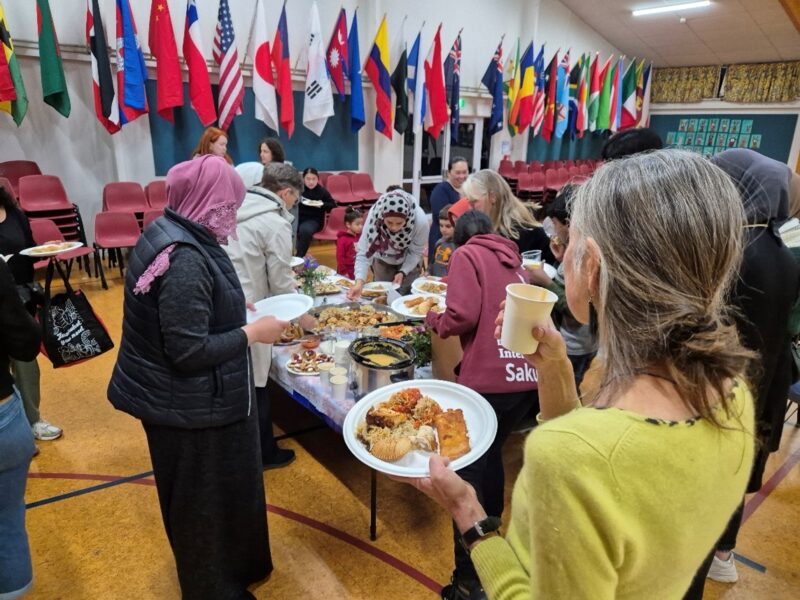
Volunteers also find their involvement with Bike Bridge fulfilling. Lois says they tend to be strong cycling advocates and enjoy helping other women to cycle. There is no shortage of volunteers, so Bike Bridge has never had to advertise.
For Lois herself, it’s the community that draws her in. She describes the lessons as joyful, and she enjoys the buzz that people get when they experience something for the first time. She also loves working with a wonderful group of women in a supportive environment.
How you can help
Bike Bridge has enough volunteers at present. But you can support the initiative by donating any good bikes or volunteering your repair skills to Bike Bridge via RAD Bikes and by helping to spread the word if you know anyone who might be interested in participating. Financial donations are also welcome – the Ministry for Ethnic Communities is Bike Bridge’s main funder, but it also relies on donations from individuals, corporate and charitable organisations.
More broadly, Lois says it’s helpful for people to be aware that some cyclists are less confident on the roads. You can help by making sure you practice kindness and make people feel welcome.
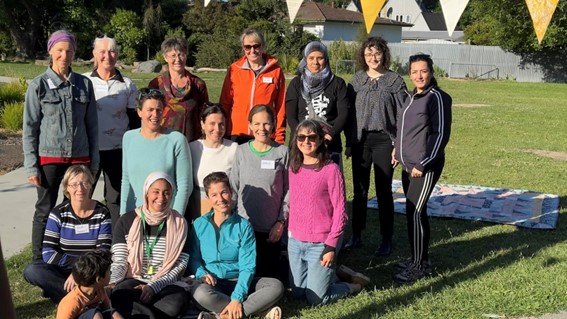

Love this initiative. Long may it prosper.